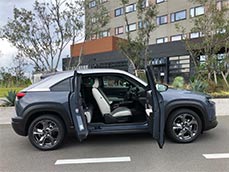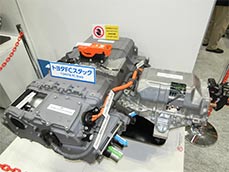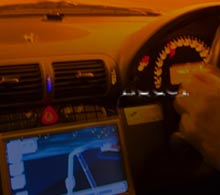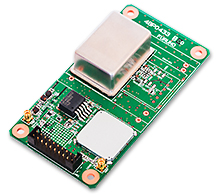Articles for ITS market What happens to CASE when gas cars are banned in Japan?
Automotive industry is confused by the government announcement
“The 2050 Carbon Neutral policy” set by Suga administration is likely to accelerate the electrification of cars in Japan.
In December 2020, the government held the 5th Growth Strategy Conference and put together the plan aimed at economic growth. Among them, there was a suggestion that Japan should take positive action toward electrification for the worldwide market. In response to this some media reported that the government would make final adjustments toward the ban on gas cars in the first half of 2030. Afterwards the content was revised to "mid-2030".
I speculate that the government may have been asked by the automaker to revise the prospects for the start of regulation. At present, the government has not officially announced their policy.
On the other hand, during a Tokyo Metropolitan Assembly meeting, Governor Koike announced that they would aim all new car sales to be ZEV (Zero Emission Vehicles) by 2030. This is twice the number of the "Zero Emission Tokyo Strategy" announced in 2019 leaving automotive manufactures confused by this sudden announcement.
Why is the regulation necessary now?
The reason why the government has enacted these policies on ZEV is that Japan lags behind Europe, America, and China in the field. Automotive engineers have thought that there would be steps for electrification, such as hybrid vehicles, plug-in hybrid vehicles, EV, and FCV. Moreover, Japan has a high penetration rate of hybrid vehicles at about 30% in the world market and has been proud to be the world leader in automotive electrification technology. However, the ESG investment which is considered not only a financial, but also Environment, Social and Governance aspects. And has become popular in late-2010smaking the electrification trend accelerate at astonishing speed.
Under such circumstances, the Japanese government has announced that they would make a major shift to electrification of cars. Certainly it can be expected to have a great effect on reducing CO2 emissions. However, the automotive industry considers these regulations too abrupt.
How will it change CASE?
Since the mid-2010s, the automotive industry has been called "a period of change once every 100 years" and steadily preparing for changes in the times with an awareness of CASE (Connected, Autonomous driving, Shared / Service, Electrification).
Originally electrification is the easiest way to understand the technological progress of CASE. As mentioned above, it is easy to understand the path of technological evolution and market expansion. The automotive industry could easily draw a roadmap for research and development if the regulations were set to some extent.
However, this sudden announcement of the Japanese government, which should have been discussed carefully, has put great psychological and financial pressure on the automotive industry.
From another point of view, the idea of electrification creates a strong impression that it is pushing the replacement demand for gasoline-powered vehicles.
Ideally reducing the number of vehicles manufactured and sold should lead to a total reduction in CO2 from the manufacturing, energy, and transportation standpoint. The purpose of CASE is to optimize such a comprehensive relationship between the car and society.
However, I feel that only E in CASE is proceeding independently in these days.
Writer introduction

Mr. Kenji Momota Automotive journalist
His major is the world automotive industry and he is also familiar with the energy industry, IT and the aging society problem as the related fields. He acts around the world based in Japan and USA and writes for the general magazines, the technology journals and the automotive related media etc.
He is also commentator of motor race and world's motor show on TV program based on his career of the driver of Indy Racing League and NASCAR. In recent years, he has been covering about a paradigm shift from developed countries to developing countries, the motorized vehicle like EV and the telematics.
FURUNO ITS Journal
Click here for the latest articles after 2022 (in Japanese)2022
- The "realistic" self-driving roadmap shown by the Japanese government and a hands-on report on the latest Subaru EyeSight X
- Will FCVs (Fuel Cell Vehicles) Become Popular? ~New Movement in Toyota and Honda~
- The 'Complete' online sales of new cars start in Japan. Will this new way of buying cars take root?
- Many Firsts! On-Site Report from Tokyo Auto Salon 2022 - The author, who knows what goes on behind the scenes, looks back on 40 years of history. -
2021
- "Moving toward zero traffic fatalities for four-wheeled and two-wheeled vehicles globally in 2050" ~Experience on Honda's latest safety technologies~
- Tsuneishi Shipbuilding's building and DX, an exclusive visit to the main factory
- Japan's Smart City: New Moves toward Practical Use
- When will self-driving buses (service cars) be put to "full-scale" practical use?
- Utilization vehicle data during disasters
- Toyota-led Connected Technology to Transform Commercial Vehicle Business -From light trucks to large trucks and buses-
- Toyota enters the connected car "Personalization" business
- Japanese automakers' carbon-neutral strategies swept up in ESG investment
- Drive experience of the latest autonomous vehicle models and advanced driving support systems
- Will carbon neutrality accelerate the trend to strengthen LCA (Life Cycle Assessment)?
- Semiconductor shortage exposes realities of the automotive industry
- Online Autonomous Driving Contest Enhancing development of Human Resources
2020
- What happens to CASE when gas cars are banned in Japan?
- When will Flying Cars be launched?
- Expectation vs. reality:Autonomous Driving in Japan
- V2X, Becoming increasingly important in autonomous driving
- Technology of Subaru “EyeSight X”
- Lifestyle-oriented French cars gain popularity in Japan
- Human-oriented smart cities are wanted
- MaaS and CASE, how would automotive industry change after COVID-19?
- The beginning of virtualization era, triggered by COVID-19
- Trend of EV shift and consumer demands
- TOYOTA Press conference about ADAS - Releasing algorithm for "sudden acceleration suppression during attempted sudden acceleration" free of charge -
- The Japanese automotive industry in 2020 - 3 turning points -
- "Using a smartphone while driving" and "Level 3 automated driving"
2019
- Motor show business model is at a turning point - Tokyo Motor Show Report -
- Commercialization and monetization of MaaS - ITS World Congress Singapore Report -
- Android Automotive pays attention to V2X - Report from the Frankfurt Motor Show 2019 in Germany -
- Automobile Distribution Revolution and DCM (Data Communication Module)
- Connected business potential and newly proposed "eMaaS" by Honda
- 5G services for practical use are multiplying
- Connectivity technologies attracting attention due to frequent traffic accidents
- Shanghai Motor Show report -SUV, EV, Automated car & 5G-
- Drone Business roadmap and updates to Michibiki (Quasi-Zenith Satellite System)
- MaaS (Mobility as a Service) "town development." Full-scale promotion for a national project
- CES organizer states "Data Period in 2020s." Transformation of the Automotive Industry in CES, US "-CES2019 Report-"
- "Return to Origin" directed towards the age of change, automatic operation and connectivity
2018
- New proposal for Private Car Automated Driving Level and other Hot 5G Technology Topics
- Standardized EV charging infrastructure concerns in Europe, US, Japan and China - Kobe EVS 31 field report -
- Touring a pure car carrier and a test drive of the latest hybrid car
- Planning stage products are exhibited at the newly established visualized mobility service "TOYOTA MOBILITY SHOWROOM".
- Potential “Community Car-share” program promoted by local residents
- CES Asia Report 2108
- Companies attempt new Vehicle-to-Infrastructure communications, including traffic volume measurements and vehicle positioning. -ITS Asia Pacific Forum in Fukuoka-
- Geneva show in Switzerland. Flying cars and MaaS (Mobility as a Service) were hot topics.
- EV (Electric Vehicle) proposals by country
- MaaS competition through service mobilization, M & A and technical field collaboration is accelerating. - The CES 2018 Report -
2017
- Big data’s initiative and fight for the automotive industry. Cooperation among companies becomes increasingly important.
- Connected car and road-to-vehicle communication automatic operation
- ETC (Electronic Toll Collection) and ETC2.0. Current situation and projected future
- Rapid development of sharing economy
- Germany is first to recognize level 3 automated driving
- ITS EU 2017 Field Reports -Automatic Operation and the eCall-
- From Infotainment to ITS, the competitive area is spreading in the car big data industry.
- GTC (GPU Technology Conference) Report and the de facto standardization of AI (artificial intelligence)
- Renesas' new challenge! "e-AI Solution" and "Renesas Autonomy"
- The Automobile industry is shifting from a manufacturing industry to a service industry.
- The movement toward accident countermeasures for aging drivers in Japan
- Fusion of ride sharing and fully automated driving is advancing in the USA.
2016
- Overview of the Quasi-Zenith Satellite System (QZSS) and advancements toward full-scale practical use including the Tokyo Olympic Games - G-space EXPO 2016 report-
- Japan’s automated driving project "SIP-adus" will be a large demonstration experiment.
- The International Home Care & Rehabilitation Exhibition. There were many car manufactures with exhibits booths at this show.
- Japanese car manufacturers starting to concentrate on strengthening the ADAS system
- A new movement of legislation for autonomous cars
- Cyber Security and “AGL”, the new OS for automotive are hot topics in the connected car industry
- “High precision 3D map” the key future of autonomous car and pedestrian dead reckoning
- Chinese “BAT” is accelerating their business in the EV (Electric Vehicle) market
- Tesla's original connection to Taiwan and the new transportation system technologies.
- "The main topic" of the Geneva Motor Show was how to strengthen "pedestrian protection"
- The probe data business is getting more competitive
- Reporting directly from the 2016 CES show "Data services will soon become the main revenue source of automotive industry"
2015
- Do the automated driving systems need the GNSS (Global Navigation Satellite System) ?
- ETC Version 2.0 is coming soon. A new service was announced at the Tokyo Motor Show and the possibility that is could be used as a device for older drivers.
- "Connected Horizon" and "eHorizon". Germany's leading parts supplier accelerates strengthening of "Big Data" for business



 The new Nissan "Note" released in December 2020. The hybrid series e-POWER which uses the engine as a generator is adopted as standard equipment.
The new Nissan "Note" released in December 2020. The hybrid series e-POWER which uses the engine as a generator is adopted as standard equipment. Mazda "MX-30" which appeared as a mild hybrid in Japan will be EV 2021, and range extender EVs that utilize rotary engines will be mass-produced.
Mazda "MX-30" which appeared as a mild hybrid in Japan will be EV 2021, and range extender EVs that utilize rotary engines will be mass-produced. The internal structure of Toyota’s "MIRAI"
The internal structure of Toyota’s "MIRAI" A fuel cell stack installed in the Toyota MIRAI.
A fuel cell stack installed in the Toyota MIRAI. GPS/GNSS Receiver&Chips and Modules (positioning and timing)
GPS/GNSS Receiver&Chips and Modules (positioning and timing)